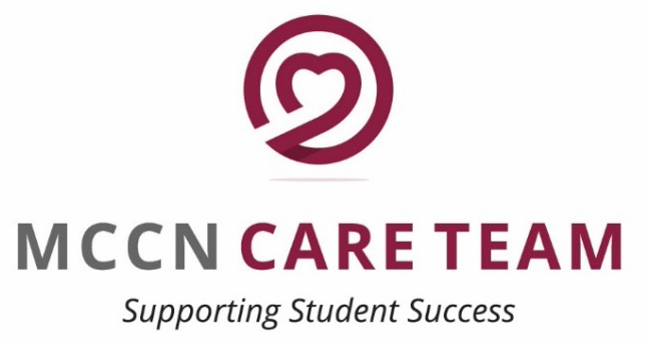
The Care Team at Mount Carmel College of Nursing receives referrals, provides assessments, and makes recommendations for students experiencing personal, emotional, academic or medical concerns.
The Care Team is made up of representatives from various departments on campus so that a well-rounded, holistic support system is in place for students. The Care Team serves as a centralized reporting source for any community member (faculty/staff, students, parents, etc) who is concerned about a student and would like assistance.

Refer a Student to the Care Team
E-Mail the Care Team at careteam@mccn.edu
The MCCN Care Team has received training from NABITA – National Association for Behavioral Intervention and Threat Assessment. E-maul us for information on Care Team training – or for the Care Team to provide additional training for your area.
The Care Team is a multidisciplinary group which includes voices from student affairs and academic affairs
- Student Accessibility Services Coordinator
- Director of Compliance & Safety
- Student Success Center Coordinator and Staff
- Director of Records & Registration
- Student Success Advisors
- Financial Aid Advisor
- Program Directors
- Academic Department Leaders
Others may join the team on an as-needed basis, including:
- Marketing & Communications Manager
- Director of Admissions and Recruitment
- Mount Carmel Health System Safety & Security
As a staff, faculty, friend or parent you are in a good position to identify who might need help as you see and talk to students on a regular basis and often in stressful situations. If you notice that a student is exhibiting one or more of the following academic, physical or emotional signs, or you just have a “gut-feeling” that something is wrong, make a referral to the Care Team.
Some signs may include:
- Academic Indicators
- Excessive procrastination and very poorly prepared work, especially if this is inconsistent with previous efforts.
- Missing assignments or exams.
- Multiple absences or excessive tardiness.
- Decline in interest or enthusiasm.
- Inability to follow assignment instructions or tasks, despite repeated attempts to clarify/encourage.
- Repeated requests for special consideration (e.g. deadline extensions).
- Dependence on professor/tutor that is beyond what is usual for a student needing assistance in your class.
- Emotional Indicators
- Emotions (sadness, nervousness, fearfulness, etc.) that are displayed to an extreme degree or for a prolonged period of time.
- Change in typical personality (e.g., more outgoing or more withdrawn than usual).
- Difficulty connecting with the community, making friends, etc.
- Difficulty dealing with a life event (e.g., death in family, relationship break-up).
- Expressions of hopelessness, isolation, or worthlessness; themes of suicide, self-harm or reference to death and dying.
- Marked irritability, anger, hostility.
- Direct mention of thoughts of self-harm, harm to others, or suicide.
- Mention of dealing with a mental health issue (depression, anxiety, BiPolar disorder, etc), substance abuse, eating disorder, etc.
- Strange or bizarre behavior that is obviously inappropriate to the situation (e.g., seeing or hearing things other people don’t).
- Physical Indicators
- Chronic fatigue or falling asleep at inappropriate times.
- Marked change in personal hygiene or appearance.
- Noticeable or dramatic change in energy level.
- Dramatic weight loss or weight gain.
- Impaired speech or confused disjointed thoughts.
- Frequently appears “hung-over” or attends class intoxicated.
- Noticeable signs of self-harm on student (cuts, burns, etc. that seem unusual).
Once the Care Team receives a referral, the team begins a response by gathering more information and reaching out to the student to offer support. How outreach happens and who does the outreach depends on the content of the referral and the initial “face-value” assessed level of concern. The response can range from an email offering support or a phone call to the student to finding them on campus to assess safety and immediate concerns.
Additionally, the Care Team meets weekly to discuss all referrals. The team works together to assess the level of concern for the student, identify areas of need, and provide holistic support services.
Due to the high volume of cases and the priority of contacting students, it is not always possible to provide updates back to the original referral source. If you would like updates or information on the student(s) you refer, please contact the Director of Compliance and Safety directly to inquire about the student.
Tips to Help
L.E.A.R.N. How to Help
Listen: Stop what you’re doing and focus on the person you are talking to. Acknowledge what you’re hearing and that you’re understanding what is being said.
Empathize: Acknowledge the person’s feelings while expressing concern and interest. Convey warmth and empathy with your voice and body language. Do not become judgmental or defensive. Just because a situation may not sound serious to you – it is serious to the person telling you. Each concern is personal and significant for that person.
Assess: Ask questions about what the student has already tried. Help them in determining strengths and where they may need other support. Ask enough to find out if this is an emergency or if the person is thinking of harming themselves or others. If they are, call Safety & Security immediately.
Refer: Brainstorm options and encourage use of campus resources. Walk with the student to find those resources. Do not agree to remain secretive or confidential about the issue.
Notify: Make a referral to the Care Team. Contact appropriate College staff based on the issues presented.
